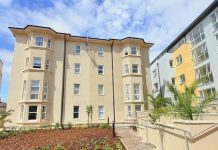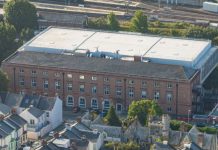The Federation of Small Businesses (FSB) is looking for a 21st century Isambard Kingdom Brunel by offering a £5,000 first prize for the winner of a competition to improve Bristol’s transport.
Just as Brunel won a competition to design and build a bridge linking Clifton with North Somerset, the FSB hopes this initiative will bring forward many innovative and original ideas to solve Bristol’s traffic problems.
A £1,000 prize is also on offer from the Association of British Drivers to improve parking in Bristol.
Businessman Guy Kingston, launching the ‘Are You The New Brunel?’ competition said: “We frequently hear the cry that ‘someone’ should do ‘something’ about the transport problems that are strangling business in Bristol.
“We have decided to put the organisation’s money where its mouth is and we will give £5,000 for the best idea we receive. Small businesses need good transport links to survive. The City Council keeps coming up with initiatives but they never seem to improve the situation. We’re sure the people of Bristol can do a better job and come up with a whole batch of good suggestions.
“Whether it is an idea that will improve transport on one road junction in the city or a scheme that encompasses the whole area we want to hear it. Ideas don’t necessarily have to involve new infrastructure, or changes to existing infrastructure. The winner may well be something that changes people’s travelling behaviour making it easier and more pleasant for us all to move around the city … and find a parking space when we get there!
“The intention is to present the best ideas to the new Mayor of Bristol and Bristol City Council and reward the person who comes up with the very best idea with £5,000. The FSB will then campaign to have these ideas implemented.”
In the last few months schemes such as turning traffic lights amber in the evenings; putting in place a system where electric driverless pods link Temple Meads with Cabot Circus and making parking free on Sundays have been suggested by organisations or Mayoral candidates.
Kingston added: “We keep getting told that our economic recovery depends on the small business sector. But the grand projects we hear about often overlook small business needs. A plumber can’t do his rounds on a bendy bus, organic veg boxes can’t be delivered by bike. Independent shops close when nearby free parking spaces are lost. Consultants need to be able to drive to meetings and park when they get there. Time wasted in traffic jams and trying to find parking spaces is a real drain on our economy. Public transport solutions may be useful for certain sections of the commuting public but for many small businesses they are never going to be fast enough or convenient enough.
“Similarly, many working parents of young children need to be able to get in and out of the city quickly if they are to drop their children off at school breakfast clubs and pick them up in time from after school clubs in the evening. They simply don’t have the option to cycle or take a bus. And, if parking becomes too inconvenient or expensive they won’t want to work in the city at all. That’ll be really bad news for our economy if we start to lose jobs to more attractive locations nearby.”
The FSB hopes many other people who use Bristol’s roads, rivers, railways, buses and cycle-ways to get around will have ideas of how to improve transport in the city.
Anyone in the UK over 18 can enter by going to www.newbrunel.org.uk and putting forward their idea on an entry form. A panel consisting of prominent business leaders from Bristol will choose the winner and the best ideas to be put forward to the local authority for consideration.
The Association of British Drivers have put up a separate prize of £1,000 for the best parking idea for the city. They say parking initiatives are needed to enable motorists to have access to the city’s businesses.
Brian MacDowall of the Association of British Drivers said:
“Private cars provide the most flexible, and most cost effective transport mode, and are used for more than 85% of journeys. But, all too often government or local councils see motorists as a cash cow to be milked at will, especially with increased parking charges and extensions of chargeable parking periods.
“Added to that road safety policy, environmental strategy, and local planning decisions have become dominated by “anti-car” factions. We see ever greater restrictions and limitation on parking, many of which seem to have no rational justification other than an inherent dislike of cars by the people imposing them. Ultimately, these misguided policies put people off from travelling into the city, causing great, but unnecessary, harm to the local economy.
“Maybe there were double yellow lines outside a school that has closed or moved. Removing the no parking restrictions creates more parking spaces and helps local retailers as potential customers will find it easier to ‘pop in for a quick look round’. Perhaps there’s some wasteland that would make an ideal car park for people who work in light industrial units. We must use our imagination and find solutions that help, not hinder, people.
“It’s a simple quality of life matter. Many journeys have to be made by car or not at all. If you can’t park easily and cheaply when you get there life is that bit more miserable. We want to change that and are keen to find some exciting and innovative ways we can expand Bristol’s parking capacity that benefits everybody and doesn’t create new eyesores in the city.”
To inspire ideas the Bristol Branch of the Federation of Small Businesses and the Association of British Drivers has called for:
Ways to improve the daily problem caused by the school run in Bristol when parents from the fringes of the city drop children off at the city’s schools.
Ways to enable people wanting to visit shops and businesses in the city to park for short periods close to premises.
Ways that people can get safely and cheaply to and from work in the city centre from the major suburbs.
Ways of improving well-known bottlenecks and roads where there are frequent traffic jams.
New cheap public transport initiatives or schemes that will help get people around Bristol en masse without making life worse for those who prefer or need to drive.
Said Guy Kingston: “We want to promote original thought and ideas. The Great Western Railway, the Clifton Suspension Bridge and the SS Great Britain were all ideas that Brunel put forward to overcome the transport issues of the day.
“They were great innovations in their time. Our challenge is for people in Bristol to show that the spirit of Brunel is still alive in the city and to come forward with modern equivalents that will make a real difference to transport in and around Bristol.”
The competition opens on Tuesday, 13th November 2012 and closes on Tuesday, 27th November 2012.






















